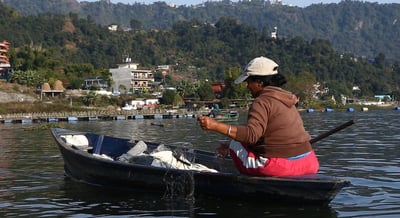NEWS
July 4, 2023

IN BRIEF
Somaya Jalari is a 70-year-old fisherwoman who, like many generations before her, has been fishing and boating on the Phewa Lake all her life. She has seen various changes taking place in Phewa Lake in her lifetime. For instance, the local and indigenous fish species are no longer available in the lake. Consequently, women and men like her who depend on the Lake have to buy new species of hatchlings from their savings and leave them in the water. Furthermore, the water has been heavily polluted by floods, weeds, and plastics which has negatively affected biotic life. Somaya says, “I [...]
SHARE
Somaya Jalari is a 70-year-old fisherwoman who, like many generations before her, has been fishing and boating on the Phewa Lake all her life. She has seen various changes taking place in Phewa Lake in her lifetime. For instance, the local and indigenous fish species are no longer available in the lake. Consequently, women and men like her who depend on the Lake have to buy new species of hatchlings from their savings and leave them in the water. Furthermore, the water has been heavily polluted by floods, weeds, and plastics which has negatively affected biotic life.
Somaya says, “I do not have any other skills apart from fishing and boating. All my children and even grandchildren know how to fish. However, fishing is not sufficient to sustain our livelihoods anymore. They have all chosen an additional profession. We did not have to worry about our meals in the past as we were sufficiently dependent on fishing. But now we can’t rely on our long-held profession for sustenance.” As Somaya has no other skill set, she is still struggling with fishing as her only livelihood option. Like Somaya, many women in Nepal depend on climate-vulnerable sustenance sources.

Nepal is one of the most vulnerable countries to climate-induced disasters. With its diverse geographical conditions, the country is burdened with changing weather patterns, excessive flooding, drying of water sources, etc. Nepal’s diversity is not only limited to geography but also many structural differences that make some groups more vulnerable to natural resource depletion, environmental hazards, and climate change. One such group is women, who are more vulnerable in our patriarchal society with challenges including high dependency on natural resources, limited access to properties, lack of education, and restrictions in mobility compared to men. The condition of women is further exacerbated by social stigma, economic backwardness, and political apathy.
Nepal’s government set a significant milestone in Gender Equality and Social Inclusion (GESI) while introducing a climate change policy in 2019. One of the key objectives of the policy is to promote GESI in Nepal’s climate change adaptation and mitigation plans across all sectors. Similarly, in its Nationally Determined Contribution (NDC), the Nepal government has stated that by 2030, all 753 local governments will prepare and implement climate-resilient and gender-responsive adaptation plans. Furthermore, it also suggests disaggregated data when reporting on progress and achievements. However, there is no specific operationalization plan to fulfill the goals of the NDCs, particularly on gender-responsive climate intervention, which shows a lack of urgency to take action.
There are many others like Somaya in the communities with their own struggles. Harimaya Parajuli, a farmer from Ghatichhina in Pokhara who is also the wife of a migrant worker, shared that she has to take up an added burden at home. In addition to taking care of her in-laws and children and doing household chores, she is also managing her farm and livestock. She said that the income from the farm has declined due to changing weather patterns. Consequently, her household is now almost entirely dependent on remittance. The stories of Somaya and Harimaya were collected by Accountability Lab Nepal’s Climate Inclusion Fellows from Pokhara, who are an integral part of the Gov-HER-Nance initiative.

“Our generation needs to take action to address climate change urgently. It will be too late if we leave it for the next generation,” says Mamata Gautam, a Climate Inclusion Fellow from Pokhara. Mamata is a Forestry student and is very keen on advocating for climate justice. Like Mamata, 30 other passionate fellows from diverse backgrounds have joined the Gov-HER-Nance initiative to push for climate justice in Pokhara Metropolitan City and Dhangadhi Sub-metropolitan City.
The Gov-HER-Nance initiative is a model that centers women in order to bring in new voices to develop solutions to issues of gender equity, environment, climate change, local development, open government, and responsible economy. It provides a platform for young women leaders from diverse sectors who are passionate about climate issues to join the campaign as climate inclusion fellows to enhance their knowledge and skills to bring out the unheard voices of their communities, advocate for sustainable, eco-friendly, inclusive governance, and become champions for climate justice in their communities.
The Climate Inclusion Fellows work at the community level by reaching out to women from different social and economic strata and gaining an understanding of their challenges through first-hand accounts. They bring voices from the margins of society to the forefront through stories, including visual stories, and advocate for specific actions to be taken by the government and other concerned stakeholders.
It is essential for the fight against climate change to go from the bottom up. With federalization, the local governments have significant rights and responsibilities to plan and implement policies to address climate change. It is important to make need-based policies, plans, and programs to minimize the effects of climate change.
Therefore, local governments should listen to the women’s and other minorities’ stories and understand the complexities of the interlinkage of gender and climate change in their communities. The local authorities should believe in the power of women’s voices in implementing climate adaptation plans and strategies and ensure that the issues that are being raised by vulnerable communities are given the utmost priority.
You can watch five powerful short films produced by our fellows here or below.
